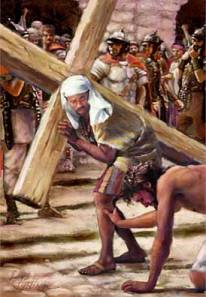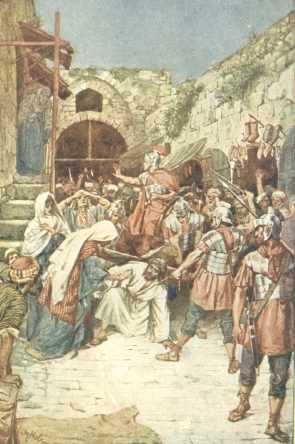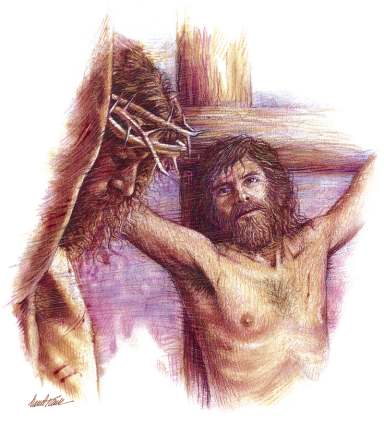|
Text
|
Comments
|
|
First
trial before Pilate. Luke 23:1-5; Matt.
27:2, 11-14; Mark 15:2-5; John
18:28-38.
|
.1
¶ And the whole multitude of them arose, and led him unto Pilate.
.And
they began to accuse him, saying, We found this fellow perverting the nation,
and forbidding to give tribute to Caesar, saying that he himself is Christ
a King.
3 And Pilate asked him,
saying, Art thou the King of the Jews? And he answered him and said, Thou
sayest it.
.4
Then said Pilate to the chief priests and to the people, I find no fault
in this man.
5 And they were the
more fierce, saying, He stirreth up the people, teaching throughout all
Jewry, beginning from Galilee to this place. |
2
- Perverting the nation Jesus had clearly avoided reasons
for accusation mt1422,
mr0145,
mr0642ff,
jn0615.
They had misinterpreted promises about the Messiah. See on lu0419.
2 -
Forbidding
to give tribute Only a few days before the Jews had tried to
get Him to make such a declaration without success mt2215.
He later had allowed others to recognize Him as king. mt2105,9.
5 -
Fierce
Or "urgent."
5 -
Stirreth
He had not stirred them toward putting Him on the throne but in helping
the people see Him as the Messiah in the resurrection of Lazarus. Compare
jn1219.
5 -
Galilee
His work began there. Compare ac1037. |
|
Hearing
before Herod Antipas.
|
6 When Pilate
heard of Galilee, he asked whether the man were a Galilaean.
.7
And as soon as he knew that he belonged unto Herod's jurisdiction, he sent
him to Herod, who himself also was at Jerusalem at that time.
.8
And when Herod saw Jesus, he was exceeding glad: for he was desirous to
see him of a long season, because he had heard many things of him; and
he hoped to have seen some miracle done by him.
9 Then he questioned
with him in many words; but he answered him nothing.
.10
And the chief priests and scribes stood and vehemently accused him.
.11
And Herod with his men of war set him at nought, and mocked him, and arrayed
him in a gorgeous robe, and sent him again to Pilate.
12 And the same day
Pilate and Herod were made friends together: for before they were at enmity
between themselves. |
7
- As soon as "Herod's jurisdiction" was Galilee and Peraea,
lu0301.
See map. What was Pilate's motivation?
8
- Desirous Herod had killed John the Baptist mr0601,
mr0629
and was worried that Jesus might be the prophet brought back to life mr0614.
He was also living in adultery mt1403,
mr0617.
8
- Hoped ... miracle Jesus didn't need to prove His divinity.
The wicked king had had plenty of evidence. Christ's divine power was not
for entertainment.
9 -
Answered
him nothing Because the testimony had already been given in
Jesus' life and ministry. Herod in particular had rejected the light from
John the Baptist. For the same reasons, He had said nothing before the
Sanhedrin and Pilate. See is5307.
11
- Set Him at naught Or "treated him with contempt" (NKJV,
RSV). |
|
Second
trial before Pilate. Matt.
27:15-31a; Mark 15:6-19;
Luke 23:13-25; John 18:39-19:16.
|
.13
¶ And Pilate, when he had called together the chief priests and the
rulers and the people,
.14
Said unto them, Ye have brought this man unto me, as one that perverteth
the people: and, behold, I, having examined him before you, have found
no fault in this man touching those things whereof ye accuse him:
15 No, nor yet Herod:
for I sent you to him; and, lo, nothing worthy of death is done unto him.
16 I will therefore
chastise him, and release him.
17 (For of necessity
he must release one unto them at the feast. |
15
- I sent you to him More recent Bible versions prefer readings
of manuscripts such as the RSV, "He sent him back to us." I prefer the
KJV. These men had been at the hearing before Herod, v.10. Pilate simply
provides the information that He had sent them. Either reading is okay.
16
- Chastise This is said to be the first whipping v16 with
the second in mt2726. |
.18
And they cried out all at once, saying, Away with this man, and release
unto us Barabbas:
.19
(Who for a certain sedition made in the city, and for murder, was cast
into prison.)
20 Pilate therefore,
willing to release Jesus, spake again to them.
21 But they cried, saying,
Crucify him, crucify him. |
19
- Sedition Or "insurrection." |
.22
And he said unto them the third time, Why, what evil hath he done? I have
found no cause of death in him: I will therefore chastise him, and let
him go.
23 And they were instant
with loud voices, requiring that he might be crucified. And the voices
of them and of the chief priests prevailed.
24 And Pilate gave sentence
that it should be as they required.
25 And he released unto
them him that for sedition and murder was cast into prison, whom they had
desired; but he delivered Jesus to their will. |
23
- Requiring Rather "asking" or "demanding."
25
- Delivered The sentence under Roman rule. |
|
Crucifixion.
Matt.
27:31b-56;
Mark
15:20-41; Luke 23:26-49; John 19:17-37.
|
 .26
¶ And as they led him away, they laid hold upon one Simon, a Cyrenian,
coming out of the country, and on him they laid the cross, that he might
bear it after Jesus. .26
¶ And as they led him away, they laid hold upon one Simon, a Cyrenian,
coming out of the country, and on him they laid the cross, that he might
bear it after Jesus.
.27
And there followed him a great company of people, and of women, which also
bewailed and lamented him. Weren't women people? Of course but, as in the
illustration, they showed unusual bravery and tenderness for their Lord.
They may also have been in a group keeping their distance from the men.
 .28
But Jesus turning unto them said, Daughters of Jerusalem, weep not for
me, but weep for yourselves, and for your children. .28
But Jesus turning unto them said, Daughters of Jerusalem, weep not for
me, but weep for yourselves, and for your children.
29 For, behold, the
days are coming, in the which they shall say, Blessed are the barren, and
the wombs that never bare, and the paps which never gave suck.
.30
Then shall they begin to say to the mountains, Fall on us; and to the hills,
Cover us.
31 For if they do these
things in a green tree, what shall be done in the dry?
26 - Laid hold on Simon I've often
thought what an honor it would have been to carry the cross, but would
I have felt that way if I had been there? We do have the opportunity lu0923.
28
- Weep not This is our compassionate
Lord. The nation had rejected His grace and Jerusalem would soon be destroyed
and many would die
mt2337.
Also
29
- Days are coming In addressing the women as "daughters of
Jerusalem," Jesus was quoting the words He had inspired Solomon to write
centuries earlier. The phrase appears seven more times all in the Song
of Solomon and first in Song
1:5.
30
- Mountains fall See re0616..
- Image
of Simon carrying the cross © 2000, Goodsalt |
.32
¶ And there were also two other, malefactors, led with him to be put
to death.
33 And when they were
come to the place, which is called Calvary, there they crucified him, and
the malefactors, one on the right hand, and the other on the left.
.34
Then said Jesus, Father, forgive them; for they know not what they do.
And they parted his raiment, and cast lots.
35 And the people stood
beholding. And the rulers also with them derided him, saying, He saved
others; let him save himself, if he be Christ, the chosen of God.
36 And the soldiers
also mocked him, coming to him, and offering him vinegar,
37 And saying, If thou
be the king of the Jews, save thyself.
38 And a superscription
also was written over him in letters of Greek, and Latin, and Hebrew, THIS
IS THE KING OF THE JEWS. |
32
- Malefactors Or "criminals." Jesus was not a criminal v4
but we as sinners are criminals. He took our place.
34
- Forgive them If they had understood and continued in sin,
they could not have received the forgiveness offered. Just think. He has
opened the door of forgiveness for you and me, too.
This is the first of seven
recorded statements of Jesus while on the cross. For the others see, v43,
jn1926,
mt2746
or mr1534,
jn1928,
jn1930,
and v46. |
.39
And one of the malefactors which were hanged railed on him, saying, If
thou be Christ, save thyself and us.
 40 But the other answering rebuked him, saying, Dost not thou fear
God, seeing thou art in the same condemnation?
40 But the other answering rebuked him, saying, Dost not thou fear
God, seeing thou art in the same condemnation?
41 And we indeed justly;
for we receive the due reward of our deeds: but this man hath done nothing
amiss.
42 And he said unto
Jesus, Lord, remember me when thou comest into thy kingdom.
.43
And Jesus said unto him, Verily I say unto thee, To day shalt thou be with
me in paradise.
- - -
- - - - - - - - - - -
40 -
Powerful testimony.
43
- Today Did the thief go to Paradise that day? One would
assume so. In Greek, as in English, this word could describe the clause
before it or the one after it. Early manuscripts did not separate words
and there was no punctuation. It was added by translators. To know whether
"today" was when the man was assured of salvation or whether it was when
he would be in paradise, we read jn2017
where we find that Jesus didn't go to heaven until after the resurrection,
so the thief could not have been with Him there. The text should read,
"Verily I say unto thee to day, thou shalt. . . ." We also know that the
Lord's promises are as good as the reality jn0336.
43
- Paradise Greek paradeisos. This is heaven
where the Father dwells lu1102. The word
is also used in re0207
which tells us that the tree of life is in paradise. The tree of life is
on both sides of the river which flows from God's throne re2201f
which is in heaven ps01104.
|
.44
¶ And it was about the sixth hour, and there was a darkness over all
the earth until the ninth hour.
45 And the sun was darkened,
and the veil of the temple was rent in the midst.
.46
And when Jesus had cried with a loud voice, he said, Father, into thy hands
I commend my spirit: and having said thus, he gave up the ghost.
47 Now when the centurion
saw what was done, he glorified God, saying, Certainly this was a righteous
man.
48 And all the people
that came together to that sight, beholding the things which were done,
smote their breasts, and returned.
49 And all his acquaintance,
and the women that followed him from Galilee, stood afar off, beholding
these things. |
46
- I commend my spirit He died as a human. Divinity would
not have died. He trusted the Father to restore His breath at His resurrection.
45
- Darkened The moon is full at Passover time. This darkness
was supernatural.
46
- Gave up the ghost Literally, "breathed out." We say "expire." |
|
Evening.
Matt.
27:56-61; Mark 15:42-47; Luke
23:50-56; John 19:38-42.
|
.50
¶ And, behold, there was a man named Joseph, a counsellor; and he
was a good man, and a just:
51 (The same had not
consented to the counsel and deed of them;) he was of Arimathaea, a city
of the Jews: who also himself waited for the kingdom of God.
52 This man went unto
Pilate, and begged the body of Jesus.
53 And he took it down,
and wrapped it in linen, and laid it in a sepulchre that was hewn in stone,
wherein never man before was laid. |
51
- Not consented Joseph and Nicodemus would have objected
at Jesus' trial before the Sanhedrin and would not have been invited.
53
- Never Or "never, ever, ever." A triple negative in the
Greek. |
.54
And that day was the preparation, and the sabbath drew on.
55 And the women also,
which came with him from Galilee, followed after, and beheld the sepulchre,
and how his body was laid.
56 And they returned,
and prepared spices and ointments; and rested the sabbath day according
to the commandment.
24:1
¶ Now upon the first day of the week, very early in the morning, they
came unto the sepulchre, bringing the spices which they had prepared, and
certain others with them.
2 And
they found the stone rolled away from the sepulchre. |
By continuing into
the next chapter we can see the sequence of days. We know that the "first
day" was Sunday because Easter is on Sunday. The day after the preparation
day and before Sunday is what we call Saturday. Luke wrote his book long
after the events happened. He could have referred to the day as "the old
Jewish Sabbath" but he didn't. It was simply "the sabbath day."
56
-
Rested ... according to the commandment It
was the fourth of the ten (or the third in the Catholic arrangement). ex2008-11.
The Sabbath had not changed. Also, Jesus "rested" in the tomb after providing
redemption for humanity as He had also rested after six days of creation,
providing a perfect home for our first parents. ge0201. |
| xx |
 .26
¶ And as they led him away, they laid hold upon one Simon, a Cyrenian,
coming out of the country, and on him they laid the cross, that he might
bear it after Jesus.
.26
¶ And as they led him away, they laid hold upon one Simon, a Cyrenian,
coming out of the country, and on him they laid the cross, that he might
bear it after Jesus.

 40 But the other answering rebuked him, saying, Dost not thou fear
God, seeing thou art in the same condemnation?
40 But the other answering rebuked him, saying, Dost not thou fear
God, seeing thou art in the same condemnation?